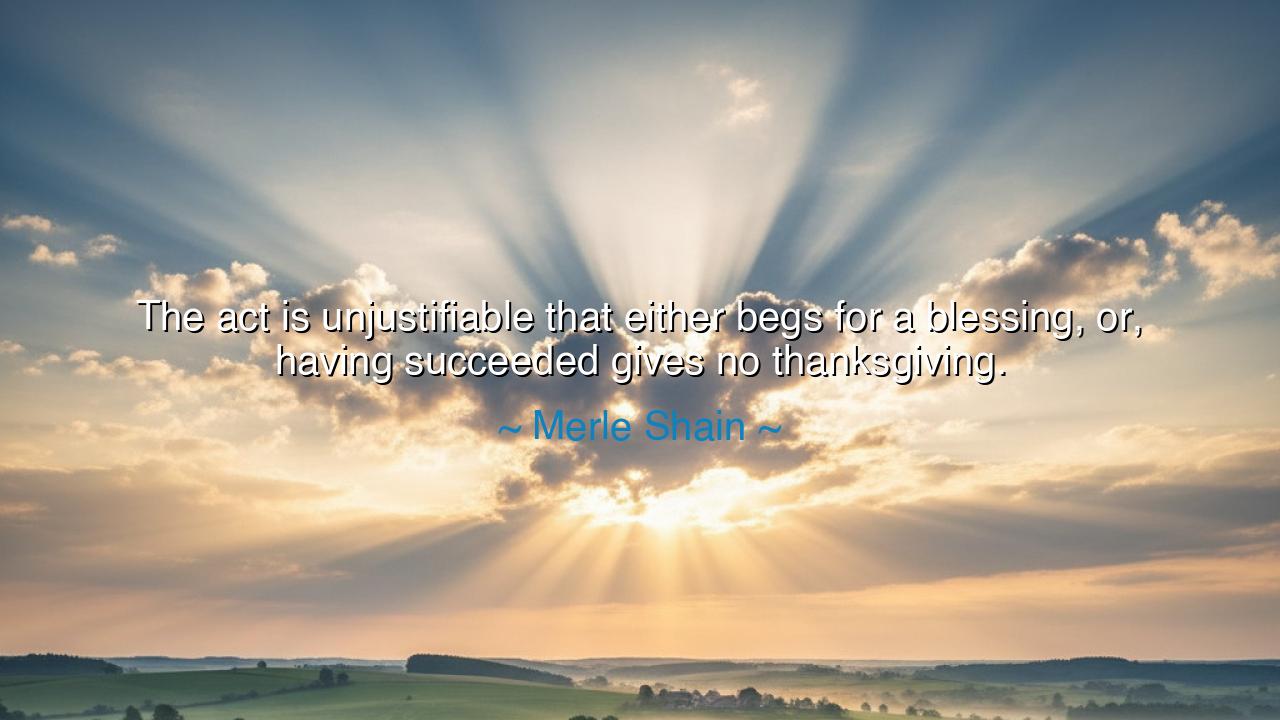
The act is unjustifiable that either begs for a blessing, or
The act is unjustifiable that either begs for a blessing, or, having succeeded gives no thanksgiving.






The words of Merle Shain, “The act is unjustifiable that either begs for a blessing, or, having succeeded gives no thanksgiving,” resound like the stern counsel of an ancient sage. In them, there is a double warning: first, against the hypocrisy of those who demand divine favor for selfish gain; second, against the arrogance of those who, once victorious, forget the hand that sustained them. The teaching is clear — to beg for grace without humility is unworthy, and to receive blessings without thanksgiving is dishonorable. In this way, Shain echoes the wisdom of ages: that gratitude must always walk hand in hand with ambition.
To beg for a blessing in this sense is not the same as humble prayer or earnest supplication. Rather, it is the act of demanding, of seeking divine favor to sanctify one’s pride or selfishness. The ancients condemned this spirit, for it reduces the sacred into a tool for human desire. Consider the tale of King Midas, who begged the gods for the power to turn all he touched into gold. His “blessing” became his curse, for even his food and his daughter were turned lifeless in his grasp. Thus Shain’s words remind us: to demand blessings without wisdom or reverence is unjustifiable, for it seeks gain without balance or humility.
Yet there is an equal danger in forgetting thanksgiving after success. To achieve, to prosper, to conquer — and then to act as if it were by one’s own hand alone — is the mark of pride that precedes downfall. History is rich with such examples. Nebuchadnezzar of Babylon looked upon his empire and declared that he had built it by his own might. But soon, madness overtook him, and he was driven into the fields like an animal, until he learned humility. Ingratitude is more than forgetfulness; it is betrayal of the divine, of the people who helped us, and of the truth that no one rises alone.
Gratitude, therefore, is the noble counterpart to ambition. To succeed without thanksgiving is to hold the crown but despise the hands that placed it upon your head. The Romans understood this when, during triumphal processions, they placed a servant behind their generals to whisper, “Remember, you are mortal.” It was a call to humility, to remind them that their victories were not solely their own. Without gratitude, triumph turns into tyranny, but with gratitude, victory becomes legacy.
Merle Shain’s words also carry a deeper moral law: that gratitude is justice. To take blessings and offer no thanks is to rob the giver of honor, whether that giver is divine or human. The unjustifiable act is not only in arrogance but in injustice, in failing to recognize and honor the sources of one’s success. Gratitude restores balance — it gives back in words, in deeds, in reverence, what was first received. Without it, the cycle of blessing is broken, and blessings themselves turn to burdens.
The lesson for us is clear: do not ask for blessings with greedy hearts, and do not withhold thanksgiving when blessings arrive. Seek what is good with humility, and if it comes, return honor with gratitude. Recognize that every success is woven with the help of others — teachers, friends, family, the unseen grace of providence. To forget them is to dishonor your own story. To thank them is to root your achievements in love, and make your legacy enduring.
As practical action, practice gratitude daily. When you ask for guidance or strength, do so humbly, not demanding but seeking what is right. And when fortune or success comes, pause to give thanks — to God, to those who helped you, to the circumstances that allowed it. Speak words of acknowledgment, write them if needed, and live in a way that honors the blessings you have received. In this way, you will walk not only as one who achieves, but as one who understands, honors, and gives back.
Thus, Merle Shain’s quote stands as a timeless teaching: it is unjust to demand blessings without humility, and it is unjust to receive them without thanksgiving. Gratitude is the key that sanctifies ambition, transforms success into honor, and keeps the heart humble even in greatness. Without it, blessings spoil; with it, blessings multiply.






AAdministratorAdministrator
Welcome, honored guests. Please leave a comment, we will respond soon